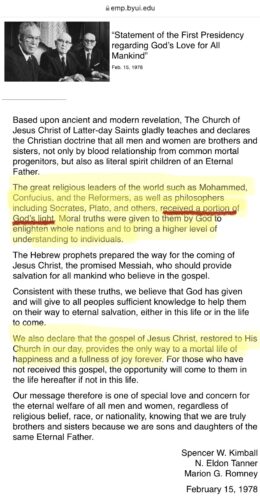This week started out more exciting than I’d prefer. My son had some friends over on Monday for the holiday for some sledding and games. Long story short, the visit ended with my son falling from a rope in the hayloft and a giant old metal pitchfork falling on top of him. Some ancestor of mine saved his life by bending up the tips of that pitchfork, and so he only ended up with a mild concussion and 4 staples. After suffering from memory loss for about 45 minutes and going into shock, he is now fine, thank heaven. Today he’s no longer in pain, though his neck is still a tiny bit stiff. The human body is an amazing thing. We were so blessed. I know Heavenly Father has great plans for my boy.
I could barely sleep Monday night thinking about what could have happened. I almost canceled Seminary, but I was hoping that our un-enrolled student would come again and I didn’t want to cancel in case he did. If I hadn’t had my lessons done a week ahead I could never have taught today or yesterday. It’s just been too crazy and exhausting. Preparing ahead has saved me from having to cancel class on more than one occasion now.
1 Kings 19-21, 2 Kings 1-2
Anyway, last night’s reading was 1 Kings 19 and 1 Kings 2. I summarized the other chapters listed above during class for continuity.
The majority of class was taken up with a discussion about how the Holy Ghost speaks to us. We read the verses about the Lord not being in the earthquake or fire or wind, but there was a still, small voice. I had the students silently read the first column from the handout “Recognizing the promptings of the Holy Ghost“. I asked the students to point out any of the things on that list they had felt and share any experiences they felt they could. Nearly all of the students shared times when they had listened to the Holy Ghost or had a prayer answered. One hadn’t listened to a warning from the spirit and was in a car accident. One was invited to some girls’ tent and he remembered a warning from a leader and did not go in. Another lost something special to her and found it. I spent a little time in Alma 32:28 and in verse 35, I think, (“Is this not real?”) and shared with them my experience with that scripture. Reading that passage was the first time I had ever heard anyone describe *what* the spirit feels like. It helped me to realize that I had been feeling it all along and that I did in fact know that the Gospel was true. It was a turning point in my life.
I was going along — it was beautiful — and the kids were marking their scriptures and the spirit was strong, and I was just finishing up when my tongue got tied up and I said something like “when the Spirit speaks to us we won’t always hear something huge, like a thunder-crap.” Yes, really. I ruined the whole thing. It was pretty funny. We all laughed and laughed. I hope that it wasn’t COMPLETELY ruined, though, and they learned something about the Holy Ghost.
I quickly covered the following things in summary:
1 Kings 19:16
1 Kings 21:21–24
1 Kings 22 chapter header
2 Kings 1:1–4 – King Ahaziah turns to false gods seeking revelation
2 Kings 1:7–8 – humorous description of how the king recognized Elijah
2 Kings 1:9 – fifties wiped out
We talked for a very few minutes about 2 Kings 2:1, where Elijah is translated (he needed physical form to pass along the keys at the Mount of Transfiguration and at the Kirtland Temple). Also covered
2 Kings 2:9 – Elisha asks a “hard thing”
2 Kings 2:13 – what does taking up the mantle mean? (the kids likened it to in Star Wars when the padowan takes up the jedi cloak)
2 Kings 2:16–18 – the people look for Elijah
We were out of time, so I put off the part about the 42 youths being killed by the bear off until today.
2 Kings 2:23–24, 2 Kings 4, 5
Today I started off by showing them an online parallel bible (http://bible.cc) so they could read the commentary about the translation of “little children” verses youths. The last one on the page notes that if Elisha had done something wrong in cursing the youths, the Lord would not have answered him affirmatively by sending the bear.
I showed the kids the parallel bible because a student had asked me a while ago if it was “a sin or something” to use other translations of the Bible. I explained to the class that there are many Bible translations, some are more literal, and others more interpretative. If you imagine a line between perfectly literal and completely interpretive, Bible translations fall in many different locations on that line. The King James version of the Bible falls in the more literal category. We use it because it’s a very conservative English translation of the Bible. A purpose of that translation was to eliminate commentary from the text as was seen in the Geneva Bible. I showed the kids another passage (2 Samuel 6:2) that I had discovered just after the student asked me about other translations, and used it to demonstrate how sometimes the translations were very different, which can cause confusion. It’s best to stick with one translation and correct or expound upon it (by way of footnotes and JST appendices), etc, to avoid making mistakes in understanding. I also pointed out that Keil and Delitzsch commentary is the one most often quoted in the Institute manuals.
(An aside, I was pretty disappointed when I used the Institute manual to help me with my lid-to-lid study of the Old Testament a few years back. It seemed to never have the answers to my questions — going right to very obvious expansion on the text instead of trying to explain the difficult passages to a lay reader. It had far, far fewer quotes from modern prophets on the material than I expected, too. Most of it comes from other commentaries, including K&D and Clarke. I found this very disappointing. Maybe my expectations were wrong, but I just didn’t like it. It *did* help me limp get through some of the more difficult passages, but I certainly didn’t feel inspired at the end, and very few of my questions were answered.)
We didn’t spend a lot of time picking apart the verses — they’re not THAT different, and really it doesn’t matter. We use the KJV for correlation and because our leaders felt it was the best version to use.
I had the kids go to the tables and we silently read 2 Kings 4. They listed the things that reminded them of Jesus Christ from the text. Here’s what we got:
– the oil was saved to pay the debt
– the barren woman was given a child
– child was raised from the dead
– the poisonous food was miraculously healed
– the loaves and corn fed many like the loaves and fishes
The kids found them all. They did a great job. I had them take their list and add it to our collection of ways Old Testament prophets are in similitude of Christ.
In 2 Kings 5, we talked about the story of Naaman. I pointed out the little maid — my favorite character — who despite being a captive, kept her faith and had the courage to share her testimony with those around her. Do you ever feel “little”? A single “little” person bearing testimony can have a great effect on others.
We also talked about Naaman and I focused in on verse 13: if the prophet had asked to you do some big thing… Naaman was humble enough to listen to his servants and do as the prophet asked. He was healed as a result.
I may stress this a little more tomorrow — do we ignore the words from our leaders, wanting a “big” revelation or something directly from the Boss himself? Do we ignore the scriptures, general conference, words of Bishop, etc? Isn’t this like when Elisha sent his servant out with the message to Naaman?
Why I didn’t do the kings list thing
I was annoyed to see in the Seminary manual and in the Institute manual that column space was given to different ways of listing the kings of Judah and Israel and whether they were good or evil. Seriously? Of all the things in the text, listing kings is the least important to these kids’ lives, in my opinion. That is busy work. This kind of fruitless busy work makes kids hate the Bible more, in my opinion. Seminary isn’t a trivia-learning exercise — it’s about helping kids put on the armor of God. Making kids hunt down trivia doesn’t do that effectively, in my opinion. Seminary teachers love charts because they’re easy to teach and prepare, and so I’ll wager a majority of Seminary teachers use this good (but not Better or Best) lesson.
So yeah, while I did mention that the kings were evil, I have not had my students list them. I showed them the Bible Dictionary, Chronology entry and gave them an opportunity the next day to use it. If they have any questions about the order of the kings or when it happened, they know where to look. In my opinion, Seminary time can be better spent than in filling out Bible trivia charts.



